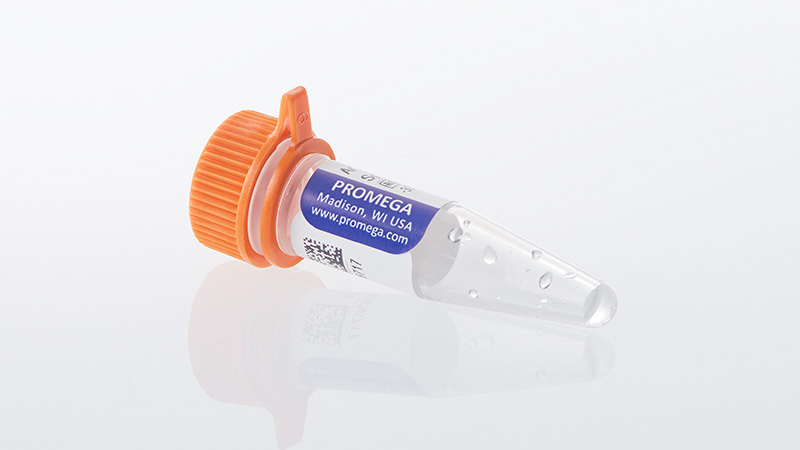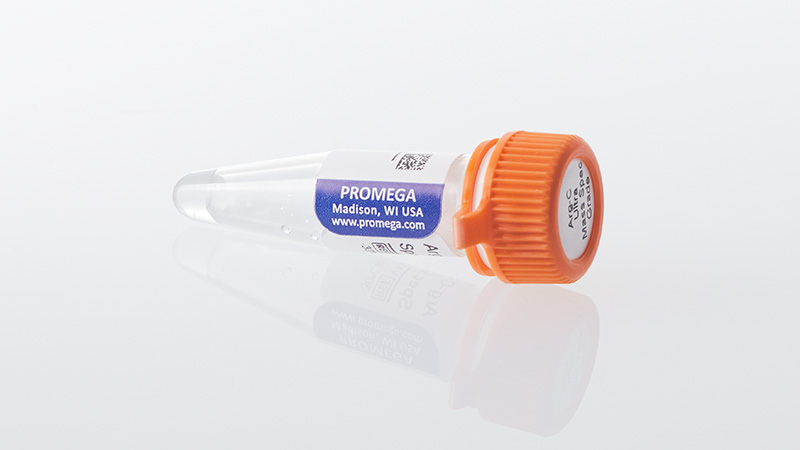Arg-C Ultra, Mass Spec Grade
Fast, Efficient and Ultra-Specific Cysteine Protease for Use Alone or With Other Proteases for Bottom-Up Proteomics
- Proteins cleaved exclusively at the C-terminus of arginine residues
- Minimal missed cleavages under optimal digestion conditions
- Complete digestion within 30 minutes to 2 hours
- Use with Lys-C or Trypsin to produce “tryptic” peptides
- Activity in 6M urea and from pH 5–9
- Broad enzyme-to-substrate ratio range enables cost efficiency based on sample and digestion conditions
Catalog Number:
Size
Arg-C Proteinase with Superior Cleavage Specificity and Efficiency for Mass Spec Analysis
The Arg-C Ultra protease is an endopeptidase that cleaves at the C-terminus of arginine residues, including the arginine amino acid next to the proline (Arg-Pro). This Mass Spec Grade enzyme can be used alone or in combination with other proteases for protein analysis by mass spectrometry and other applications. Arg-C Ultra has robust digestion activity with a pH range from pH 5.0–pH 9.0.
Applications
- Protein Identification
- Characterization of post-translational modifications, particularly on lysines
- Minimization of missed cleavages in trypsin workflows using Arg-C Ultra with Lys-C or Trypsin
- Peptide mapping of biotherapeutics
- De novo peptide sequencing

Arg-C Ultra offers superior specificity and efficiency over standard Arg-C and Trypsin proteases. Human K562 extract was digested overnight at 37°C with the indicated proteases using a 1:50 enzyme-to-substrate ratio. Peptides were analyzed by LC-MS/MS on an Orbitrap Exploris™ 240 (Thermo Fisher Scientific). Data analyses were conducted using Byonic software (Protein Metrics) with no enzyme specified.

Effect of urea concentration on digestion efficiency of Arg-C Ultra, Mass Spec Grade, and Lys-C. Human K562 extract was digested with Arg-C Ultra, Mass Spec Grade, or native Lys-C at 1:100 for 2 hours at 37°C at a variety of urea concentrations. Peptides were analyzed by LC-MS/MS on an Orbitrap Exploris™ 240 (Thermo Fisher Scientific). Data analyses were conducted using Byonic software (Protein Metrics, Inc.) with no enzyme specified.

Effect of pH on digestion efficiency of Arg-C Ultra, Mass Spec Grade. Human K562 extract was digested with Arg-C Ultra, Mass Spec Grade, at 1:100 for 2 hours at 37°C at different pH concentrations. Peptides were analyzed by LC-MS/MS on an Orbitrap Exploris™ 240 (Thermo Fisher Scientific). Data analyses were conducted using Byonic software (Protein Metrics, Inc.) with no enzyme specified.
Protocols
Complete Protocol
Specifications
Catalog Number:
What's in the box?
| Item | Part # | Size | Concentration |
|---|---|---|---|
Arg-C Ultra, Mass Spec Grade |
VA183A | 1 × 5μg | 0.2μg/μl |
SDS
Search for SDSCertificate of Analysis
Use Restrictions
For Research Use Only. Not for Use in Diagnostic Procedures.Storage Conditions
What's in the box?
| Item | Part # | Size | Concentration |
|---|---|---|---|
Arg-C Ultra, Mass Spec Grade |
VA183B | 1 × 20μg | 0.2μg/μl |
SDS
Search for SDSCertificate of Analysis
Use Restrictions
For Research Use Only. Not for Use in Diagnostic Procedures.Storage Conditions
Resources
Featured Resource
Characterization of a new ultra-selective, highly active Arginine-C protease for MS-based proteomics
Arg-C Ultra is successful in various applications, including characterization of bulk proteomes, hard-to-digest samples like muscle tissue, and post-translational modifications, particularly at lysine residues.

Related Products
Similar Products
Lys-C, Mass Spec Grade
Cleavage site: C-terminal of Lys. Optimal pH: 7–9.
VA1170
rAsp-N, Mass Spec Grade
Cleavage site: N-terminal of Asp. Optimal pH: 6–9.
VA1160
Glu-C, Sequencing Grade
Cleavage site: C-terminal of Glu. Optimal pH: 4–9.
V1651
PNGase F
Catalyzes cleavage of N-linked oligosaccharides between the innermost GlcNAc and asparagine residues.
V4831
Frequently Used With
Magnetic Proteomics Sample Prep (MPSP) Kit
MPSP magnetic beads for streamlined sample preparation for bottom-up proteomics.
CS3325A04
Sequencing Grade Modified Trypsin
Highly active and stable trypsin manufactured to provide maximum specificity.
V5111, V5117, V5113
Trypsin Gold, Mass Spectrometry Grade
Maximum digest specificity with extreme resistance to autolytic digestion.
V5280
Trypsin/Lys-C Mix, Mass Spec Grade
Increased peptide recovery, enhanced protein quantitation, improved reproducibility.
V5071, V5072, V5073
rLys-C, Mass Spec Grade
Cleavage site: C-terminal of Lys. Optimal pH: 8–9.
V1671
Trypsin Platinum, Mass Spectrometry Grade
Maximum digest specificity. Maximum resistance to autoproteolysis.
VA9000
Iodoacetamide
A sulfhydryl alkylating agent that forms covalent bonds with thiol groups, preventing disulfide bond formation. A component of the AccuMAP® Low pH Protein Digestion Kit.
VB1010
TCEP
A thiol-free reducing agent used for reducing disulfide bonds and maintaining reducing activity at low pH. A component of the AccuMAP® Low pH Protein Digestion Kit.
VB1000
ProteaseMAX™ Surfactant, Trypsin Enhancer
For improved in-gel digestion and protein solubilization.
V2071, V2072




